Related Research Articles
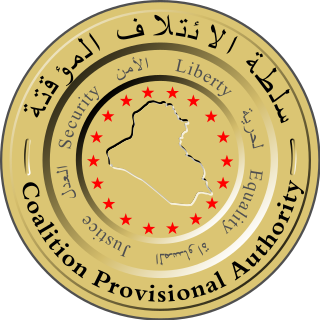
The Iraqi Governing Council (IGC) was the provisional government of Iraq from 13 July 2003 to 1 June 2004. It was established by and served under the United States-led Coalition Provisional Authority (CPA). The IGC consisted of various Iraqi political and tribal leaders who were appointed by the CPA to provide advice and leadership of the country until the June 2004 transfer of sovereignty to the Iraqi Interim Government.

Ghazi Mashal Ajil al-Yawar is an Iraqi politician. He was the vice president under the Iraqi Transitional Government in 2006, and was interim president of Iraq under the Iraqi Interim Government from 2004 to 2005. He also served as the president of the Governing Council of Iraq in 2004 following the US-led coalition invasion.

Ayad Allawi is an Iraqi politician. He served as the vice president of Iraq from 2014 to 2015 and 2016 to 2018. Previously he was interim prime minister of Iraq from 2004 to 2005 and the president of the Governing Council of Iraq in 2003.

Mowaffak Baker al-Rubaie is an Iraqi politician, and was Iraq National Security Advisor in the government of Prime Minister Ayad Allawi and in 2005–2006 Prime Minister Ibrahim Al Jaafari and 2006–2009 Prime Minister Nouri al-Maliki. He was elected to the Iraqi Council of Representatives in December 2005 as a nominee of the United Iraqi Alliance and from 2014–2018 in the Iraqi Parliament.
Nuri al-Badran was the Minister of Interior in the cabinet appointed by the Interim Iraq Governing Council in September 2003. A secular Shiite Muslim, Badran served in the government of Saddam Hussein as ambassador to the Soviet Union until fleeing Iraq upon its 1990 invasion of Kuwait. In exile, he joined the Iraqi National Accord opposition group. Badran resigned his post in April 2004 amid a corruption scandal.
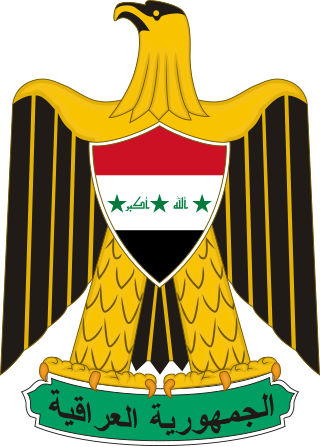
The Iraqi Interim Government was created by the United States and its coalition allies as a caretaker government to govern Iraq until the drafting of the new constitution following the National Assembly election conducted on January 30, 2005. The Iraqi Interim Government itself took the place of the Coalition Provisional Authority on June 28, 2004, and was replaced by the Iraqi Transitional Government on May 3, 2005.
The General Security Directorate (GSD) was the intelligence agency of Iraq. Although details on its organisation were not made clear at the time, the General Security Directorate's designated mission was to "infiltrate and annihilate Iraq's tenacious insurgency".

The Iraqi National Intelligence Service is the chief intelligence agency of Iraq. It was created with the help of the CIA to replace the Mukhabarat, after the latter was dissolved.
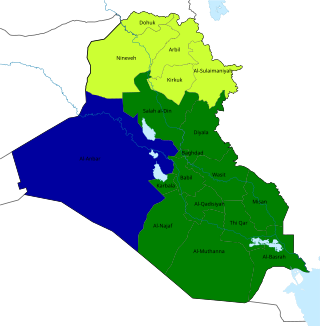
Parliamentary elections were held in Iraq on 30 January 2005 to elect the new National Assembly, alongside governorate elections and a parliamentary election in Kurdistan Region. The 275-member legislature had been created under the Transitional Law during the international occupation. The newly elected body was given a mandate to write a new constitution and exercise legislative functions until the new constitution came into effect. The elections also led to the formation of the Iraqi Transitional Government.
The Iraqi Intelligence Service also known as the Mukhabarat, General Intelligence Directorate, or Party Intelligence, was an 8,000-man agency and the main state intelligence organization in Iraq under Saddam Hussein. The IIS was primarily concerned with international intelligence collection and analysis but also performed many activities inside Iraq in conjunction with the Directorate of General Security as a secret police organization.
Ziyad Cattan is a dual citizen of Poland and Iraq. He earned a PhD in Economics. During the twenty years he lived in Poland Cattan operated both a used car and a pizza companies.

Thamir Abbas Ghadhban is an Iraqi civil servant and politician.
Sheikh Hussein Ali al-Shaalan is an Iraqi politician and tribal leader. A Shia Arab from Diwaniya, he was elected to the Council of Representatives of Iraq in the Iraqi legislative election of December 2005 from the Iraqi National List coalition.

Parliamentary elections were held in Iraq on 7 March 2010. The elections decided the 325 members of the Council of Representatives who would elect the prime minister and president. The elections resulted in a partial victory for the Iraqi National Movement, led by former Interim Prime Minister Ayad Allawi, which won 91 seats, making it the largest alliance in the Council. The State of Law Coalition, led by incumbent Prime Minister Nouri Al-Maliki, was the second largest grouping with 89 seats.

The Ministry of Defence is the cabinet-level ministry responsible for national defence in Iraq. It is also involved with internal security.
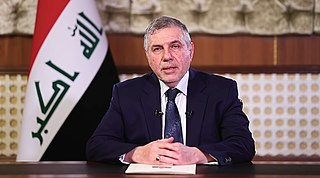
Mohammed Tawfik Allawi is an Iraqi politician who was the Iraqi Prime Minister-designate in 2020, and twice Minister of Communications in the Al Maliki government from May 2006 until August 2008 and from 2010 to 2012. Both times he resigned from his position in protest against al-Maliki's sectarian agenda and political interference. He was nominated to serve as Prime Minister of Iraq in February 2020, but withdrew his nomination after Parliament failed to reach a quorum.
Alawi means "follower of Ali" or "descendant of Ali", and is a common surname in the Muslim world. In Arab countries occupied by the British Empire, the name is transliterated as "Alawi". In Arab countries that were occupied by the French Third Republic, the name is transliterated as "Alaoui". In South Asia it is usually transliterated as "Alavi" or "Alvi".
In the aftermath of the 2010 election, great attention was given to the decision on who should be the next Iraqi PM. Both al-Iraqiyya's Allawi and the State of Law coalition's al-Maliki laid claim to the post, so it was seen as up to the Kurdish parties and the Iraqi National Alliance to decide this matter.
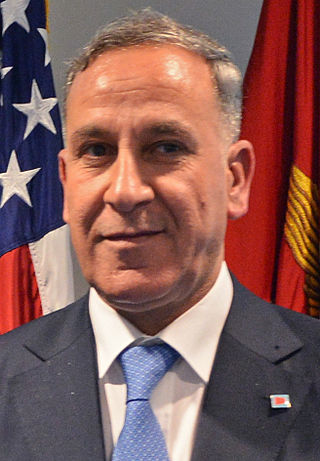
Khaled Yassin al-Obaidi is an Iraqi politician who served as the defense minister of Iraq from 2014 to 2016.
Malas Mohammad Abdulkarim al-Husseini al-Kasnazani is an Iraqi politician who was the Trade Minister from September 2014 until December 2015 under Prime Minister Haider al-Abadi.
References
- ↑ Iraq Ministers Archived 2008-09-16 at the Wayback Machine , Middle East Reference, accessed on 2007-10-14
- 1 2 What has happened to Iraq's missing $1bn? Archived 2008-05-17 at the Wayback Machine , The Independent, 2005-09-19
- ↑ Documents reveal Iraqi defense minister was member of dreaded Mukhabarat Archived 2005-11-23 at the Wayback Machine , Mehr News Agency, 2005-01-15
- ↑ Luke Baker. Iraq Issues Arrest Warrant for Hazim al-Shaalan [ dead link ], Reuters UK, 2005-10-11
- ↑ "BBC uncovers lost Iraq billions". BBC. 2008-06-10. Retrieved 2015-08-22.
- ↑ "January 2012 Quarterly Report to Congress" . Retrieved 2015-08-22.